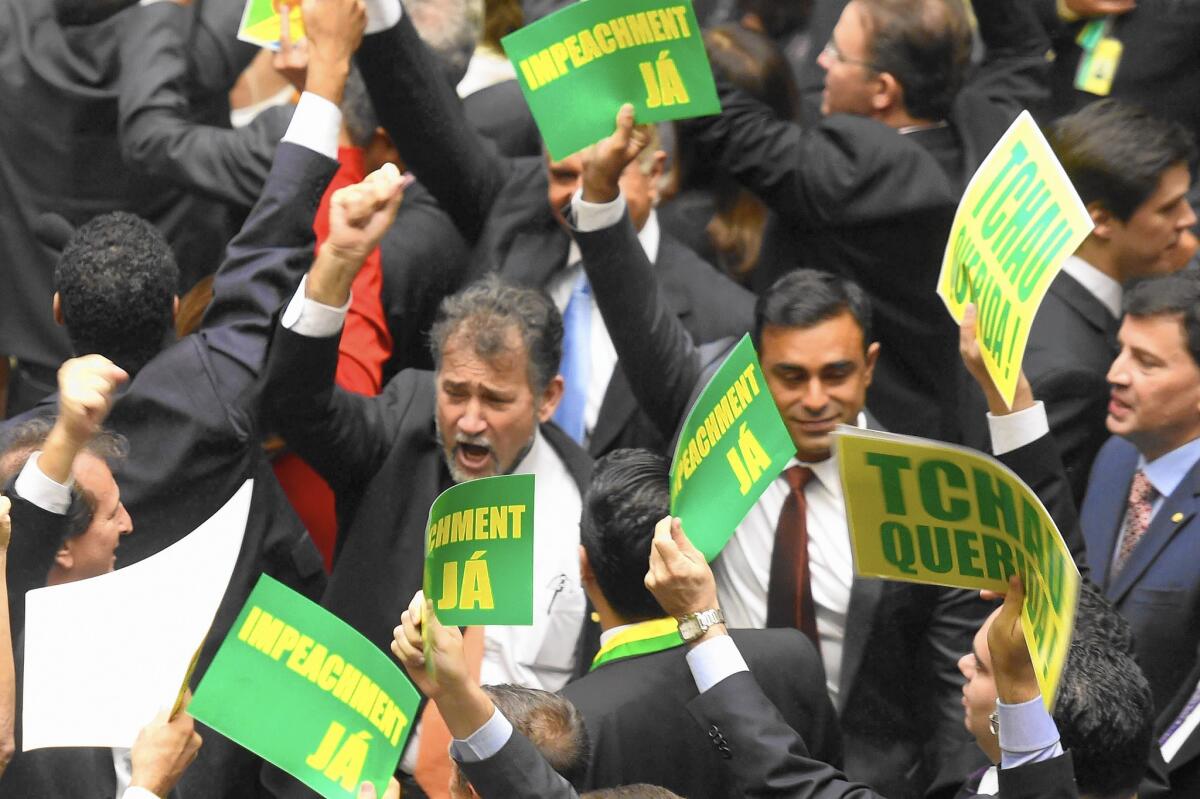Brazilians watch helplessly as impeachment crisis nears climax

Reporting from SAO PAULO, Brazil — Not long after former metalworker and union leader Luiz Inacio Lula da Silva was elected Brazil’s first progressive leader since the end of its dictatorship, he turned heads around the world by overseeing an economic boom that lifted tens of millions of Brazilians out of poverty.
He served two terms, from 2003 to 2011, and his popularity was enormous here and in the international community, which awarded the country with the 2014 World Cup and 2016 Rio Olympics.
But now the world’s fifth most populous nation is embroiled in its worst recession in decades, a multibillion-dollar corruption scandal and a dizzying political crisis.
On Sunday, the crisis could reach its climax — or set the stage for yet more turmoil — when Brazil’s lower House votes on whether to impeach Lula’s now-unpopular successor, Dilma Rousseff.
Rousseff’s government and Lula have fought back fiercely against impeachment in the courts, on the streets and in the halls of the capital, Brasilia, accusing corrupt political elites of plotting a “coup” to seize power.
The vote could be close. But no matter what the outcome in Brasilia this weekend, few people here expect a clear path out of the crisis to open in the near future.
Both sides are promising a national unity government if they win. It’s a farce to imagine this could occur.
— Peter Hakim, president emeritus at the Inter-American Dialogue, a Washington think tank
“Brazil’s political system is confronting its most difficult test since the transition from military dictatorship to civilian rule and democracy in the 1980s,” said Peter Hakim, president emeritus at the Inter-American Dialogue, a Washington think tank that focuses on relations with Latin America. “It’s likely that Sunday’s vote will be the definitive one for Dilma’s future. But both sides are promising a national unity government if they win. It’s a farce to imagine this could occur.”
Rousseff’s government is deeply unpopular and has lost legislative support. A government led by the vice president who would succeed her, former ally Michel Temer, may have to confront its own legal challenges, lack of public support and dubious stature in the international community, Hakim notes.
See more of our top stories on Facebook >>
Most Brazilians believe that the country is in trouble and that Rousseff’s Workers’ Party administration has made grave mistakes. But it is far from agreed that the current impeachment effort is the best way to move forward, and its organizers have come under fire. Luis Almagro, secretary general of the Organization of American States, recently criticized the impeachment process.
The effort to remove the president is not based on any accusation of personal corruption — Rousseff faces no charges in the courts — but rather that she used widely practiced accounting maneuvers to hide budget shortfalls. This may not qualify as the serious crime which the Constitution says is required for impeachment, critics say.
Recent polls show that around 60% of Brazilians support impeaching Rousseff, but a similar amount also support impeaching Temer. A higher percentage is favorable to new elections.
Unlike Rousseff, over half of the lawmakers voting on her removal do face accusations of corruption or serious crimes.
And Speaker Eduardo Cunha, who has led the impeachment charge since December, is being tried by the Supreme Court on charges of taking tens of millions of dollars in bribes. The head of Brazil’s federal prosecution office has requested he be removed from office — as have Brazilians opposing Rousseff’s impeachment.
NEWSLETTER: Get the day’s top headlines from Times Editor Davan Maharaj >>
Cunha and Temer belong to the Brazilian Democratic Movement Party, whose ideology is fluid.
“It’s one thing to disagree with the government, criticize its errors, and ask for more dialogue and participation,” said Lula in a recording sent to journalists and lawmakers Friday. “It’s another to embark on adventures, believing in the siren song of those who make premature plans to take the throne.”
He was likely referring to Temer, who earlier this week released a 15-minute recording — supposedly by accident — of the inauguration speech he plans to give if Rousseff falls.
Meanwhile, as politicians bicker and jockey for position in case a new government forms, Brazilians suffer.
Unemployment jumped to 9% last year and continues to rise, while inflation hit double digits and salaries have lagged. The political crisis has sapped the government’s ability to tackle the problems the country had even at the peak of its boom, such as gaping inequality, a shocking homicide rate, poor public services and a racially divided society.
Over the last month, hundreds of thousands of Brazilians taken to the streets around the country to demand Rousseff’s removal, and smaller protests have mobilized to oppose impeachment. But over the last few days, many Brazilians have been able to do little but watch coverage of undecided Congress members making up their minds and speculate on backroom horse-trading.
“We feel powerless. I should be working, but I can’t pull myself away from the news,” says Angela Milanese, a translator in the southern state of Santa Catarina who has commented regularly on developments on social media. “It’s out of our hands. They are supposed to represent us, but let’s face it, most of them only care about their political interests.”
In Brasilia, authorities have set up a fence to divide pro-impeachment and anti-impeachment protesters from each other and prevent violence. A vote Sunday, when Brazil’s government rarely works, will allow for larger protests and public spectacle.
Cunha has determined the agenda for the voting, which could take several hours.
Impeachment requires a two-thirds vote in the lower chamber, and both sides have insisted they have enough votes to win, while local media polls have tended to give the edge to impeachment supporters. Impeachment would later have to be accepted by a majority vote in the Senate.
The remaining undecided voters are making decisions based on their careers, their political base, as well as their legal standing under whatever government comes next, says Francisco Fonseca, a political scientist at the Fundacao Getulio Vargas business school in Sao Paulo.
He believes some lawmakers hope that a Temer-Cunha administration would save their skins by stopping or stifling the ambitious investigations that have uncovered so much corruption over the last year.
“What is clear is that we have seen massive political mobilization across the country,” Fonseca said. “Come Monday, neither side is going to easily accept defeat.”
Bevins is a special correspondent.
ALSO
The breakthrough that’s leading to a new golden age of space travel
Coachella promoters look to book Dylan, Stones, McCartney and Young for mega-concert
California minimum wage hike hits L.A. apparel industry: ‘The exodus has begun’
More to Read
Sign up for Essential California
The most important California stories and recommendations in your inbox every morning.
You may occasionally receive promotional content from the Los Angeles Times.










